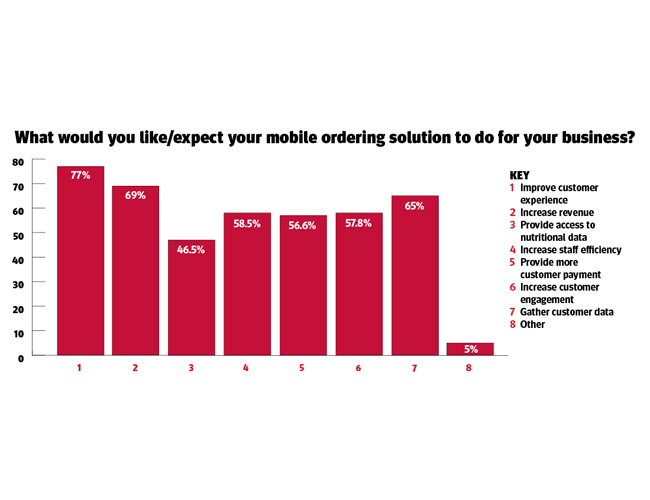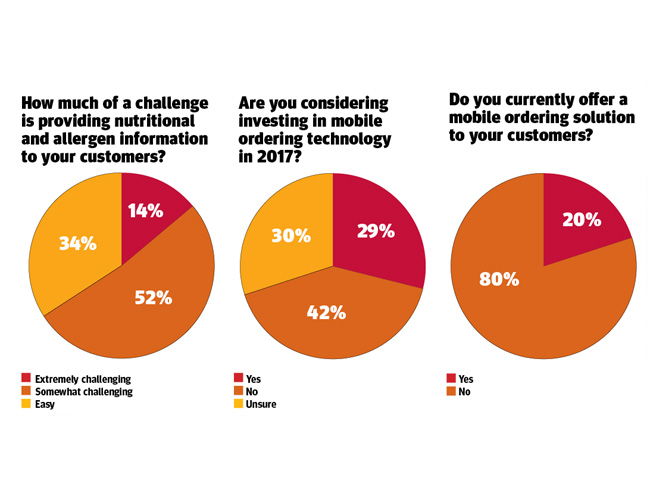Mobile ordering: everything you need to know to adopt the technology
Customers are crying out for mobile ordering, but many establishments are lagging behind when it comes to the advantages of adopting new technology. Elly Earls discovers exactly what operators need to know
According to new research by The Caterer in partnership with mobile ordering provider Wi-Q Technologies, 80% of hospitality businesses don't yet offer a mobile ordering solution, a finding that's come as little surprise to either technology providers or operators. While customer demand clearly exists, hoteliers and restaurateurs are put off by perceived high costs and don't want to risk being the first in their industry to take the plunge. In five years, though, we could be looking at a very different picture.
However, Wi-Q co-founder Graham Cornhill does think there's a more positive way to look at it. "I would see the headline figure as 20% do offer mobile ordering which, at this stage of our product evolution, is very encouraging," he says.
"Clearly, customer awareness for mobile ordering solutions has a long way to go, with customer education being driven largely by the efforts of corporates such as McDonald's and Starbucks," Cornhill continues. "It is my belief that while these big players are delivering inferior app-based solutions, they are creating new service expectations, which is a critical long-term driver to changes in our ordering culture."
A natural evolution Other positive news to come out of the research was that demand for mobile ordering clearly exists. Almost a third of operators that do offer these solutions said that up to 40% of their customers are using the technology. For Cornhill, the reason for the popularity of such solutions is simple.
"From accessing Wi-Fi to communicating, millennial customers demand the least route of resistance in everything they do; we know this isn't going to change," he says. "Our whole lifestyle is driven around the devices we use to communicate and handing over the control of product ordering directly into the hands of our customers is a natural evolution of technology in the hospitality space."
Oli Ingham, head of marketing at Mexican chain Wahaca, a brand that was quick to get involved in the mobile payments through its partnership with FlyPay, agrees: "This is a great example of technology fixing a long- running consumer problem - nobody enjoys waiting for a bill to arrive at the end of a meal.
"Customers want to be going on to the next bar or heading home, and restaurants are keen to be able to offer a table to their next customers, so it's a win for everyone. If we can ensure that it's a seamless process, there's no reason that anyone using the technology won't become an advocate."
Wise investment Customer demand is clearly driving uptake, as almost a third of survey respondents are considering investing in mobile ordering technology this year, with the vast majority expecting it would improve customer experience (77%) and increase revenue (69%). For John Keating, general manager at Fairmont St Andrews hotel in Fife, Scotland, this makes sense as anything that improves and benefits the customer's stay is worth investment.
"Guests, in particular those on business, are often time-poor and do not want to wait. They will work on the go and make the most of their time by pre-booking and paying for activities at their convenience," he says.
"The industry is realising the need to embrace the 'Y' generation, who now make up most of our workforce and customers. We need to understand their philosophies and values, which are very different to those of my generation, to engage with them and accommodate these changes and appreciate their views on technology and a work-life balance."
That said, introducing a new technology to customers is always a process that needs to be handled carefully, says Anthony Lynsdale, vice-president of IT at Atlantis, the Palm, UAE. The hotel recently adopted Wi-Q's poolside and beach bar mobile ordering solution (see panel). "I'm not convinced customers are ready to adopt mobile ordering - we want to connect them with new technology so we need to make sure it's tailored to them and offer a seamless experience," he says. "Atlantis, the Palm is a large resort with open-air dining. There are only so many runners you can have on a beach, so if you can reach customers through technology, it's a great delivery model, but we need more awareness to get buy-in from the majority of guests."
The next step will be to observe how guests are responding to the solutions offered by Wi-Q - whether that's using full mobile ordering or simply using the 'call the waiter' button. "Their adoption will tell us what we need to know," Lynsdale says.
Back in the UK, David Wilby, chef-patron at Windsor Grill in Windsor, Berkshire, agrees that operators - particularly of independent businesses - need to take adoption of new technologies slowly. "While it is really important that we use technology to ensure we are adding to our guests' experience, it's also really important to make sure we don't lose sight of the fact that tech will not be a substitute for human interaction," he says. "As a small independent, experience is everything - that's why balance is really important."
Breaking the cost barrier Respondents' bigger barrier to adopting a mobile ordering solution is cost, with more than half thinking it would set them back over £1,000. Yet, while this may be true of app development, Cornhill is keen to stress that Wi-Q's cloud-based solutions offer a low-cost entry point into mobile ordering, making it accessible to operators across the hospitality sector.
"Hospitality operators rely on the advice they are given, and rarely are key IT people encouraged to innovate and consider intuitive customer access via cloud-based solutions," he says. "We know that app development is heavily loaded in capital expenditure at the front end, and we consistently see high-profile customers burning into seven figures before they are able to understand that it's not working for them. For many reasons, such as cost, speed of access, scalability and device limitations, a cloud-based solution offers a compelling challenge to app development."
In response to this, Wi-Q has developed a SaaS model for operating expenses to be justified against revenue generated. "In the same vein as core cloud technology, any upfront capital expenditure can either be kept to a minimum or diluted into monthly SaaS fees," Cornhill explains. "This is the future model that will remove barriers from the market and enable low-cost entry to world-class mobile ordering solutions in the hospitality space."
Five years later Although many operators hope to introduce mobile ordering over the next 12 months, Cornhill doesn't believe cloud-based solutions will become commonplace for much longer.
"If we look at adoption lifecycles, we have engaged with innovators and early adopters, but have yet to move to early market, where corporates will not engage without extensive market reference," he says. "Innovation is exciting, technology is boundless, but the simple fact is that every part of the business, from front of house to finance, needs to be engaged, and it's not commonplace yet. In five years, I expect to see a transformed industry, where use of cloud-based applications is driving customer delivery and revenues."
Ingham agrees. "I think consumer adoption is going to increase as advocates drive usage through peer-to-peer recommendation, and as brands battle for smartphone storage space, app-based solutions will become replaced by equivalent web-based versions."
The key for Keating will be to ensure that technology doesn't replace the personal service that makes the hospitality experience special. "Brand loyalty can be fickle, so we must continue to recognise each guest wants an individual experience and we must be willing to adapt to meet these needs," he says. "There are many areas mobile ordering could be used, from luggage shipping to room service - however, face-to-face interaction is still a significant selling point and makes an experience personal and engaging, which will impact on the growth of mobile ordering."
How Atlantis, the Palm took mobile ordering outside Atlantis, the Palm, decided to adopt Wi-Q's mobile ordering technology for its pool and beach area precisely because it wasn't an app.
"The majority of companies that we have been in conversations with are offering similar solutions to Wi-Q, but you have to download an app. I believe that apps have peaked and they are on their way out; customers just don't want apps clogging up their devices," says Anthony Lynsdale, vice-president of IT at Atlantis, the Palm. "The future is in web applications. We needed the agility of a web app to overcome integration challenges."
"Personally, when I look at what myself and my peers are doing, we are already doing so much on our mobiles and I expect that we will extend those capabilities. As an industry, we are going to interact with guests and hotel staff more and more through our mobile devices, integrate systems and improve processes."
Instant updates on allergens Almost 50% of survey respondents would expect a mobile ordering solution to provide access to nutritional and allergen information, which is not only becoming increasingly important to consumers, but is also a regulatory requirement across the EU.
For Wi-Q co-founder Graham Cornhill, it's an expectation technology providers should easily be able to meet. "One of the major benefits of any mobile ordering solution is in enabling instant updates across companies' real estate," he says. "The long-term benefits and savings in accommodating changing legislations, meeting customer expectations and negating the printing and production of marketing material are palpable."
It's certainly something Anthony Lynsdale, vice-president of IT at Atlantis, the Palm is keeping in mind as he looks ahead. "The government in Dubai is committed to providing information for our tourists," he says. "We provide everything as standard on our menus, but for guests to be able to elect allergen-specific menus at the touch of a button will improve the experience further."












